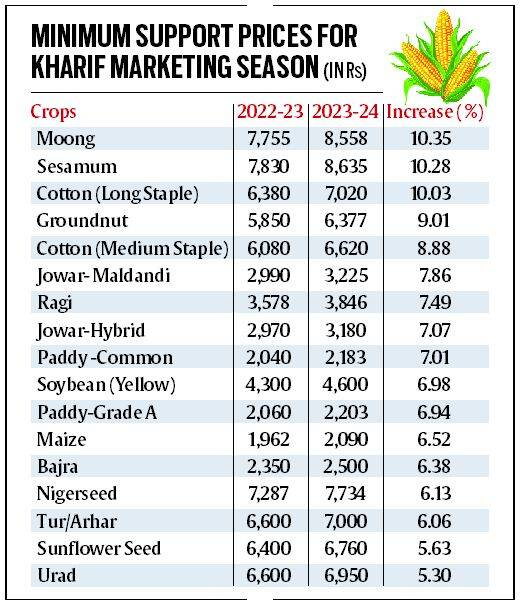From UPSC perspective, the following things are important :
Prelims level: National Food Security Act (NFSA)
Mains level: demands of farmers for a legal guarantee for MSP

Central Idea:
Farmers in India are demanding a legal guarantee for Minimum Support Prices (MSP) to stabilize agricultural commodity prices and ensure their livelihoods. Despite the longstanding demand and political consensus, successive governments have been hesitant to implement this, primarily due to concerns about fiscal costs. However, the actual costs and benefits of such a guarantee are often misunderstood, leading to fear mongering and misconceptions about its implications.
Key Highlights:
- Farmers’ demands for a legal guarantee for MSP stem from the need for stability in agricultural commodity prices to protect their incomes.
- MSP is a mechanism to ensure price stability for essential agricultural commodities, but its implementation is limited, mainly focusing on rice and wheat.
- Misconceptions about the fiscal costs of MSP guarantee have hindered its implementation, despite political consensus and support from various parties and unions.
- The cost of procuring agricultural produce is often misconstrued, with the majority being a subsidy to consumers rather than to farmers.
- A guaranteed MSP offers an opportunity to rectify imbalances in the MSP and procurement system, promoting regional diversification and crop expansion.
- Neglect of the agrarian economy has led to declining real incomes and wages for farmers, highlighting the urgency of reforming the MSP system.
Key Challenges:
- Misunderstanding and fear mongering about the fiscal costs and implications of implementing a legal guarantee for MSP.
- Limited implementation of MSP, primarily focusing on rice and wheat, leaving other crops and regions underserved.
- Neglect of the agrarian economy leading to declining real incomes and wages for farmers.
- Political hesitancy to implement MSP guarantee despite consensus and support from various stakeholders.
- Lack of comprehensive understanding of the benefits of MSP guarantee in stabilizing agricultural commodity prices and reviving the rural economy.
Main Terms:
- Minimum Support Prices (MSP)
- National Food Security Act (NFSA)
- Price Stability
- Market Intervention
- Agricultural Commodity Prices
- Fiscal Costs
- Marketable Surplus
- Procurement System
- Agrarian Economy
- Regional Diversification
Important Phrases:
- Legal guarantee for MSP
- Fear mongering and misconceptions
- Fiscal requirements
- Price volatility
- Market intervention
- Income protection
- Regional imbalances
- Declining real incomes
- Rural economy revival
- Comprehensive reform
Quotes:
- “A guaranteed MSP may not solve the farmers’ problems. But it offers a good opportunity to rectify the imbalances in the MSP and procurement system.”
- “Protecting the income of farmers will help revive the rural economy at a time when it’s struggling with deficient demand and rising inflation.”
- “Misconceptions about the fiscal costs of MSP guarantee have hindered its implementation, despite political consensus and support from various parties and unions.”
Anecdotes:
- The article references the fear mongering and misconceptions similar to those observed during the enactment of the National Food Security Act and the National Rural Employment Guarantee Act.
- It highlights the success of MSP implementation for rice and wheat during the last two years, where market prices were higher than MSP.
Useful Statements:
- “Despite political consensus, successive governments have dithered on legalizing this mechanism, primarily due to the fear of excessive fiscal requirements.”
- “A guaranteed MSP offers an opportunity to rectify the imbalances in the MSP and procurement system, promoting regional diversification and crop expansion.”
- “Protecting the income of farmers will help revive the rural economy, particularly during times of deficient demand and rising inflation.”
Examples and References:
- Reference to the successful implementation of MSP for rice and wheat during the last two years, despite market prices being higher than MSP.
- Comparison with other countries where similar mechanisms exist to stabilize agricultural commodity prices.
- Mention of the fear mongering and misconceptions observed during the enactment of previous agricultural legislations like the National Food Security Act.
Facts and Data:
- Government procurement of wheat in 2022 was only 19 million tonnes against a target of 44 million tonnes.
- In 2023, government procurement of rice and wheat was 26 million tonnes against a target of 35 million tonnes.
- Reference to the cost of procuring agricultural produce being misconstrued, with the majority being a subsidy to consumers rather than to farmers.
Critical Analysis:
The article provides a comprehensive analysis of the demands of farmers for a legal guarantee for MSP, highlighting the misconceptions and challenges surrounding its implementation. It emphasizes the importance of rectifying imbalances in the MSP and procurement system to promote regional diversification and crop expansion. However, it could further delve into the specific policy measures needed to address these challenges and provide a more detailed analysis of the potential benefits of implementing a guaranteed MSP.
Way Forward:
- Implementing a legal guarantee for MSP to ensure stability in agricultural commodity prices and protect farmers’ incomes.
- Rectifying imbalances in the MSP and procurement system to promote regional diversification and crop expansion.
- Addressing misconceptions and fear mongering surrounding the fiscal costs and implications of MSP guarantee through public awareness campaigns and comprehensive policy discussions.
- Engaging with stakeholders, including farmers’ unions, political parties, and policymakers, to formulate and implement effective MSP policies that address the needs and concerns of all parties involved.
- Investing in rural infrastructure, storage facilities, and crop diversification programs to strengthen the agrarian economy and revitalize rural communities.
Get an IAS/IPS ranker as your 1: 1 personal mentor for UPSC 2024

